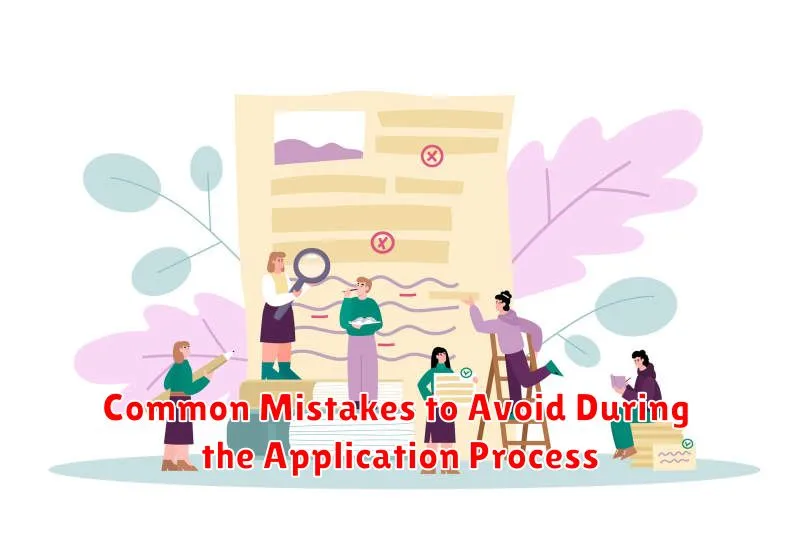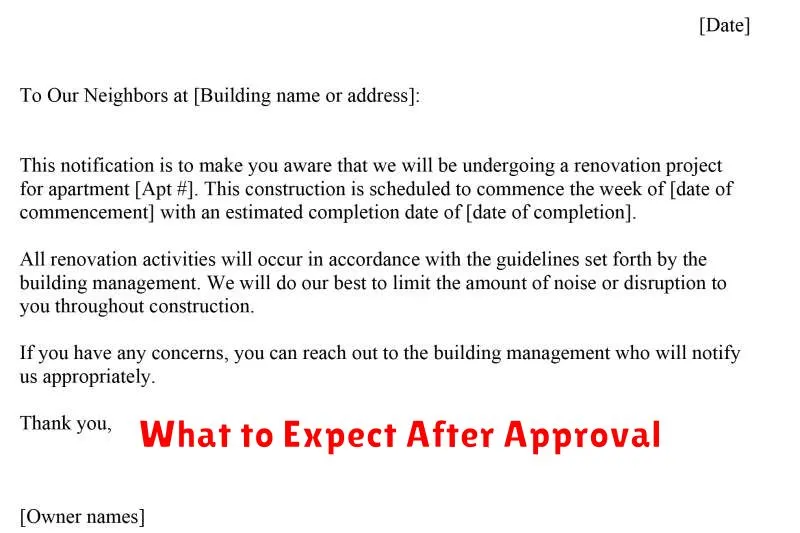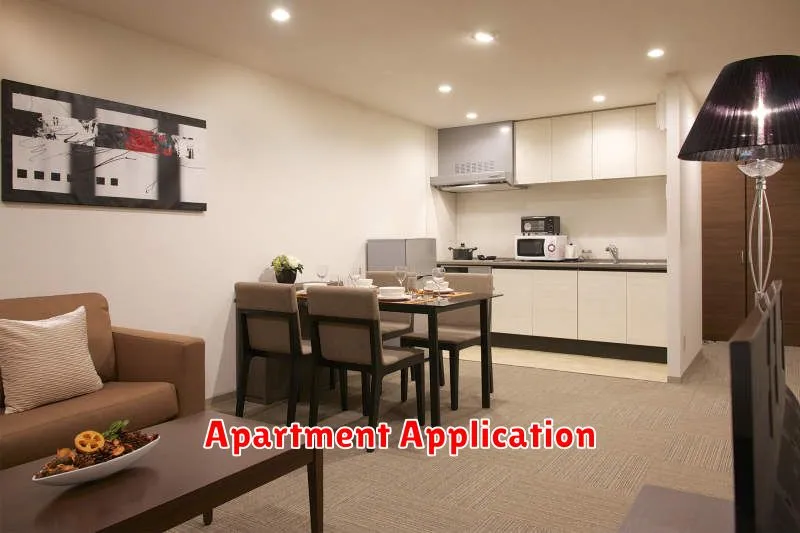Are you ready to take the leap and move into your own apartment? The apartment application process can seem daunting, but with a little planning and preparation, you can make it a smooth and successful experience. From understanding the basics of the process to knowing what documents you need, we’ll guide you through every step to ensure you’re ready to land your dream apartment. This guide will cover everything from finding the perfect apartment to navigating the application process, so let’s get started!
Gathering Necessary Documents and Information
Before you start applying for apartments, it’s crucial to gather all the necessary documents and information. This will ensure a smooth and efficient application process. Here’s a checklist of what you’ll need:
Personal Identification:
- Government-issued ID (driver’s license, passport, etc.)
- Social Security card
Financial Information:
- Pay stubs (last two to three months)
- Bank statements (last two to three months)
- Credit report (obtain a free copy from credit bureaus)
- Letter of employment (if self-employed)
Rental History:
- Previous landlord’s contact information
- Rental history report (if available)
- Letters of recommendation from previous landlords
Other Documents:
- Pet information (breed, weight, vaccination records)
- Co-signer’s information (if applicable)
- References from previous employers or professors
It’s essential to have all of these documents readily available before submitting your application. This will make the process much quicker and ensure that you have a strong application.
Improving Your Credit Score Before Applying
Your credit score is a crucial factor in the apartment application process. Landlords often use it to determine your financial responsibility and ability to pay rent on time. A higher credit score can make you a more attractive tenant, potentially leading to an easier application process.
Here are some tips to improve your credit score before you apply for an apartment:
- Check your credit report. You can obtain a free copy of your credit report from each of the three major credit bureaus (Equifax, Experian, and TransUnion) at AnnualCreditReport.com. Review your report for any errors or inaccuracies that may be dragging down your score.
- Pay your bills on time. Late payments are one of the biggest factors that hurt your credit score. Set up automatic payments or reminders to ensure that your bills are paid on time.
- Keep your credit utilization low. Your credit utilization ratio is the amount of credit you’re using compared to your total available credit. Aim for a utilization ratio of under 30%.
- Avoid opening too many new credit accounts. Every time you apply for a new credit account, a hard inquiry is added to your credit report, which can lower your score.
- Consider a secured credit card. If you have a limited credit history, a secured credit card can be a good option to build credit. You make a security deposit that acts as your credit limit.
It’s important to note that improving your credit score takes time. By following these tips, you can start building a strong credit history that will benefit you in the long run.
Preparing for the Background Check
A background check is a standard part of the apartment application process, and it’s important to be prepared. Landlords use background checks to verify your identity, rental history, credit history, and criminal record. To ensure a smooth process, take these steps:
Review your credit report: Check for any errors or inaccuracies. You can obtain a free copy of your credit report from each of the three major credit bureaus: Experian, Equifax, and TransUnion.
Be prepared to provide references: Landlords may contact your previous landlords or employers to verify your information. Make sure you have their contact information readily available. Be sure to request your previous landlords to be prepared for a reference check.
Understand your rights: Familiarize yourself with your rights related to background checks. In some areas, landlords may be limited in what they can ask for or how they can use the information. Know what information a landlord can and cannot request from your background check.
By being prepared, you can increase your chances of a successful apartment application and avoid any potential delays or complications.
Writing a Compelling Rental Application Letter
A rental application letter is your chance to make a good first impression on a potential landlord. It’s an opportunity to stand out from other applicants and showcase your strong rental history, financial stability, and responsible character. A well-written letter can be a powerful tool in securing your dream apartment.
Here’s how to craft a compelling rental application letter:
- Start with a Strong Opening: Begin with a clear and concise statement expressing your interest in the property. State the specific apartment you’re applying for and mention how you learned about the listing.
- Highlight Your Strengths: Emphasize your positive rental history. If you have a strong track record of paying rent on time and maintaining properties, be sure to mention it. If you’ve been renting for a long time, it’s also beneficial to highlight your longevity.
- Showcase Your Financial Stability: Demonstrate your ability to afford the rent. You can do this by mentioning your current job, salary, and other sources of income. Be sure to provide details on your employment history and how long you’ve been employed at your current company.
- Demonstrate Your Responsibility: Highlight your good character and responsible habits. Mention any hobbies or activities that showcase your trustworthiness and reliability. You can also mention any positive experiences with previous landlords.
- Express Your Interest in the Property: Show your genuine interest in the apartment. If you have any specific features or amenities that appeal to you, mention them.
- Conclude with a Call to Action: Thank the landlord for their time and consideration. End by expressing your willingness to meet and discuss the application in more detail.
By following these tips, you can write a compelling rental application letter that will impress potential landlords and increase your chances of getting approved.
Securing References and Letters of Recommendation
One crucial step in the apartment application process is securing references and letters of recommendation. These documents provide landlords with valuable insights into your character, reliability, and history as a tenant. When seeking references, choose individuals who can speak positively about your responsibility, payment history, and overall tenant experience. This might include previous landlords, employers, or trusted acquaintances.
It’s courteous to inform these individuals in advance that you’ll be using them as references and to provide them with your contact information. It’s a good idea to give them a heads-up about the specific apartment you’re applying for so they can be prepared for the request. Providing them with a template or key talking points can also be helpful.
When requesting a letter of recommendation, be specific about what you would like the letter to include. This might be information about your character, work ethic, or financial responsibility. It’s always helpful to provide a clear and concise outline or talking points for the letter.
Remember to always express your gratitude to those who agree to serve as references and provide letters of recommendation. A simple thank you note or email can go a long way in showing your appreciation.
Understanding Application Fees and Deposits
As you start your apartment search, you’ll likely encounter two common fees: application fees and security deposits. It’s crucial to understand these costs before applying to ensure you’re financially prepared.
Application fees are typically charged by landlords to cover the administrative costs of processing your application. These fees cover background checks, credit checks, and other screening procedures. They range from $20 to $100 or more, depending on the location and property.
Security deposits, on the other hand, are held by the landlord as a financial safeguard against damages or unpaid rent. They’re usually equivalent to one or two months’ rent and are refundable upon moving out, provided the apartment is left in good condition.
It’s essential to clarify the specific terms and conditions for both application fees and security deposits. Ask the landlord about their refund policies and the circumstances under which they may be deducted from your deposit. This information will help you make informed decisions and avoid any surprises during the application process.
Common Mistakes to Avoid During the Application Process

The apartment application process can be stressful, especially if you’re competing with other applicants for a coveted unit. To increase your chances of getting approved, avoid these common mistakes:
Failing to read the application thoroughly. It may seem obvious, but many applicants skim over the details. Make sure you understand the requirements, fees, and deadlines before submitting your application.
Providing inaccurate information. Double-check all the information you provide, including your contact details, employment history, and financial information. Inaccurate information can raise red flags and lead to rejection.
Not providing all required documents. The application will likely ask for specific documents, such as proof of income, credit reports, and rental history. Ensure you gather everything and submit it on time.
Ignoring communication from the landlord or property manager. Be responsive to emails, phone calls, and other communication. Ignoring their requests could be interpreted as a lack of interest.
Skipping the background check. Many landlords will conduct a background check before approving you. Ensure you have a clean record and address any potential issues before applying.
Not asking questions. Don’t be afraid to ask questions about the application process or the apartment itself. This shows you’re serious about renting the unit.
Applying for too many apartments. While applying for multiple apartments can increase your chances of finding a place, applying for too many can hurt your chances. Each application can negatively impact your credit score.
Tips for Increasing Your Chances of Approval

The apartment application process can be a stressful one, but it’s important to be prepared. By following these tips, you can increase your chances of getting approved for your dream apartment.
First, make sure you have a solid understanding of your credit score. Landlords will often check your credit score as part of the application process. A good credit score is essential for getting approved for an apartment.
Next, make sure you have sufficient income to cover the rent. Landlords will typically require you to earn at least three times the monthly rent to qualify for an apartment. If you don’t meet this requirement, you may need to find a roommate or look for a less expensive apartment.
Finally, be prepared to provide references. Landlords will often ask for references from previous landlords or employers. It’s a good idea to have these references ready before you apply for an apartment.
By following these tips, you can increase your chances of getting approved for an apartment. Remember to be honest and upfront with your landlord about your financial situation.
Following Up After Submitting Your Application

You’ve submitted your application and now you’re waiting. The wait can be nerve-wracking, but don’t despair. Following up after submitting your application is a good way to demonstrate your interest and ensure your application doesn’t get lost in the shuffle.
First, check the application instructions. Some applications will include a timeline for when you can expect a response. If not, wait a few days to a week before following up.
You can follow up in a few ways. A quick email or phone call to the leasing office is a good start. Be polite and professional, restating your interest in the apartment and your application. You can also use this opportunity to ask about the status of your application or inquire about any missing documents.
Remember, following up is a good way to stay on top of the process and show you’re serious about the apartment. It’s also a good way to get a feel for how responsive and professional the leasing office is.
What to Expect After Approval

Congratulations! Getting approved for an apartment is a big accomplishment. Now that you’ve been approved, there are a few things you can expect to happen before you can officially move in:
Lease Signing: You’ll be asked to sign a lease agreement which outlines the terms of your tenancy, including the rent amount, the lease duration, and any rules or regulations. Make sure to read through the lease carefully before signing.
Security Deposit and First Month’s Rent: You’ll likely need to pay your security deposit and first month’s rent before moving in. These payments are typically made through a cashier’s check or money order.
Move-In Date and Key Pickup: Once your lease is signed and all payments are made, you’ll be given a move-in date and instructions for picking up your keys.
Pre-Move-In Inspection: Before moving in, it’s a good idea to schedule a pre-move-in inspection with the landlord or property manager. This will allow you to document any existing damage or issues with the apartment so you can avoid any potential disputes later on.
Utilities: If you haven’t already, you’ll need to set up utilities for your new apartment. This includes electricity, gas, water, and internet. You can contact your local utility companies to get started.

